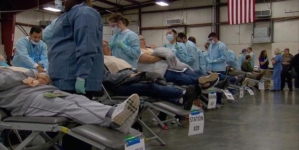-
Giants’ Matt Chapman delivers walk-off two-run home run to stun Braves - 9 mins ago
-
How to Watch Portugal vs Spain: Live Stream UEFA Nations League Final, TV Channel - 17 mins ago
-
It’s a living: Earning patronage on Patreon - 19 mins ago
-
How to spot fake login alert scams and protect your online accounts - 43 mins ago
-
Patch Adams wins 2025 Woody Stephens Stakes - 52 mins ago
-
Israel Will Block Greta Thunberg’s Boat From Reaching Gaza: IDF Chief - 58 mins ago
-
It’s a living: Earning patronage on Patreon - about 1 hour ago
-
Packers Attempted to Make Intriguing Wide Receiver Trade: Report - 2 hours ago
-
Terry Bradshaw on relationship with Art Rooney, picks Belmont Stakes winner & more - 2 hours ago
-
Take this week’s American Culture Quiz and test your knowledge of film, sports and more - 2 hours ago
President Trump on Monday suggest he might temporarily exempt the auto industry from tariffs he previously imposed on the sector, to give carmakers time to overhaul their highly complex supply chains.
Mr. Trump on Monday told reporters gathered in the Oval Office that automakers “need a little bit of time” to relocate production from Canada, Mexico and other places to the U.S.
Car manufacturers’ supply chains are tightly interwoven with other nations, making it almost impossible to make vehicles entirely in the United States.
Because U.S. automakers source many of their car parts from key trade partners, including Canada, Mexico and China, a fully-American made car doesn’t exist, according to experts.
Mr. Trump has previously reversed course on tariffs, causing upheaval in the financial markets, and leading to economists raising their expectations of the U.S. economy entering a recession this year.
The 25% tariffs on foreign-made cars, which Mr. Trump designed with the intention of reshoring auto manufacturing to the U.S., threaten to raise car prices for consumers by thousands of dollars.
The price of a typical car could rise by between $5,000 to $10,000 “out of the gates” due to the new tariffs, according to a March 31 estimate from Wedbush Securities analyst Dan Ives.































